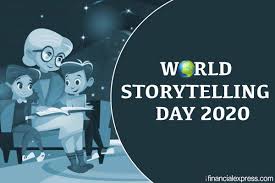Storytelling plays a very important part in every person’s life. Stories that we grew up hearing, taught us the difference between right and wrong. Eager to tell our parents stories about our day, is a way in which we express ourselves. The stories we were told as children have remained with us for our entire lives and through us it will continue to be passed down for generations, serving the same benefit as it did for us. As we think about how prevalent stories are in our lives, let’s walk through the history of storytelling, from ancient history to present day.
Early beginning of the storytelling
The history of storytelling goes back to thousands of years. Cave dwellers used pigments to paint on walls with their hands to create stories and myths. The ancient Greeks carved their language on the walls to tell how history was moving forward. The narrative voice in writing speaks volumes about daily life followed by people of different cultures across the world. As generations grow and develop, the lives of people have changed according to the change in times and the earlier practices become a part of history. Through the tradition of story telling, humanity gets stronger and tales and myths are created with new and exciting innovations and technology.
The Chauvet Cave in Southern France contains incredibly well-preserved cave drawings dating back to 30,000 years. On the walls of the cave, explorers found paintings depicting the prehistoric period. This was how they formed unspoken and unwritten languages to communicate. The cave drawings told stories about encountering mammoths, lions and rhinos. The paintings depicted their everyday activities of using homemade weapons to fight wild animals that attacked them.
The Ancient Greeks lived on islands, where they discovered ways to use their tools to carve messages into tombs and slates. Their stories for thousands of years were communicated only through storytelling(Oral Tradition). The Greeks were the first known civilization to develop writing and apply it to storytelling. They used to leave messages and write poems on tombs and slates. They used animals like pigeons to deliver urgent messages. Most of their communication was in times of sorrow, war, and celebration.
The epic of Gilgamesh, a story of a summerian King, which dates back to around 700 BC, is a story about a man named Gilgamesh and a "wild man" named Enkidu who befriends Gilgamesh after a fight, and they set off on a journey to find the key to immortality. The Greeks were so passionate about the art of story telling, these stories were written as poems to help the storytellers remember and perform the whole story.
Today, we tell stories through multiple methods, illustrations, written word, and oral storytelling. What began in the early stages as cautionary tales or part of ceremonial practices, has evolved into a method of exploring emotion, developing vocabulary, and strengthening overall cognition. Storytelling is important in all cultures, not only to hear, but also to tell.
Storytelling has earned its place as the most important tradition humans possess. The most important reason for this, is that every story contains a lesson to instruct the audience. Stories teach us to love, to forgive others, and to be a good human being. The greatest stories ever told function as a reflection of the world we live in and of both the goodness and evil present in our world. Storytelling also fulfills a crucial need of society by providing exemplary role models through their characters. It shows ordinary people performing extraordinary deeds, not because they are forced to, but because they choose to make the right choice. Storytelling has numerous important effects on our daily lives. It has been one of the most effective sources of inspiration known to us. Storytelling acts as a fantastic teaching tool, imparting lessons of life to individuals of all ages. Storytelling has proven its resilience and necessity beyond any shadow of doubt. Its effect has shaped our world in numerous and varied ways, some boringly obvious to see and understand and some which remain more obscure and elusive in their significance. The value storytelling holds as a source of inspiration and as a teaching tool makes it the most important tradition mankind possesses.

